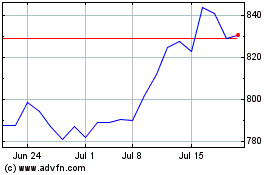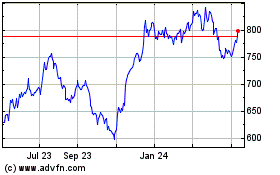By Dawn Lim
The biggest U.S. money managers are working to convince
Washington that they don't harm competition among corporations as a
debate about their sway has caught the attention of regulators.
BlackRock Inc. and Vanguard Group have been getting in front of
officials and disseminating research in an effort to quash concerns
that large institutions' holdings of multiple companies in a single
sector hurts competition.
In doing so, they are diving into a divisive debate on so-called
common ownership. At issue is the broad ownership across companies
in a given sector by investment firms like BlackRock and Vanguard,
which combined manage nearly $13 trillion in investor money.
Many in the asset-management industry, government and academic
circles say there isn't clear evidence of whether common ownership
causes anticompetitive effects.
But the fear is that by owning chunks of many companies in a
sector, say in airlines or banking, investors are influencing them
to act in ways that maximize gains for all. That is opposed to
pushing individual companies to compete more vigorously with rivals
and undercut one another on price.
This could end up hurting consumers, some economists say. That
possibility has gotten attention in Washington at a time when the
power of financial firms is drawing fire from Democratic
presidential candidates such as Elizabeth Warren and Bernie
Sanders.
Staff at the Federal Trade Commission are evaluating studies of
common ownership to help the antitrust enforcement agency decide
how it will approach the issue. The FTC also is updating commentary
on mergers of companies in a sector and has been weighing whether
to include theories on how common ownership could harm
consumers.
Justice Department antitrust chief Makan Delrahim in a May
speech said he is following the debate around whether enforcement
officials should use existing measures or new approaches to
understand common ownership's effects.
Meanwhile, presidential candidate Sen. Amy Klobuchar (D., Minn.)
has introduced a bill to get the FTC to study the effect of common
ownership in certain industries. In hopes of staving off any
potential legislation, the industry has been presenting its side to
lawmakers. The Investment Company Institute, a fund-industry trade
group, led a group of asset managers in meetings with lawmakers on
the common-ownership issue in May 2018, people familiar with the
matter said.
The scrutiny comes amid the rapid growth of a few firms thanks
in part to the rising popularity of low-cost index funds that track
markets and invest broadly across sectors. The biggest --
BlackRock, Vanguard and State Street Corp. -- now hold about a
fifth of the S&P 500 through funds they run for investors.
That gives the firms considerable power over American
corporations. They can cast pivotal votes that determine everything
from who sits on a company board to how executives deal with issues
ranging from climate change to pay equity.
As the companies have grown, they have had to fend off attacks
that indexing could distort prices, or is " worse than Marxism."
There is also concern that control over public companies will be
concentrated in the hands of a few firms.
While no changes in U.S. antitrust policy or limits on asset
managers are expected in the near future, the debate around common
ownership has put the firms on the defensive.
This summer, a group from Vanguard met with Robert Jackson Jr.,
a Democratic commissioner at the Securities and Exchange
Commission, presenting its own research showing that common
ownership hasn't harmed competition. The findings sparked a
spirited exchange over the firm's methodology, according to people
familiar with the meeting.
Vanguard's study, published in August, looked at 200 industries
and marked the first time the firm published a formal take on the
issue. It started planning to become more proactive in 2018 after
monitoring the topic for a few years, a person familiar with the
matter said.
The firm is scheduled to revisit the issue with Mr. Jackson
before he leaves office next year, according to people familiar
with the matter.
The common-ownership debate bubbled up in 2014 as new research
on the issue started rippling through academia and Washington.
BlackRock staffers had differing views on how to deal with the
matter at first. Some thought the firm needed to be louder; others
believed it should avoid fanning the discussions, according to
people familiar with the matter.
BlackRock became more vocal in 2017. It questioned the validity
of a study, originally circulated online in 2014, that kicked off
the current debate around common ownership. That paper argued that
as airlines are backed to a greater degree by investors with shares
in rival airlines, ticket prices rise.
While several economists questioned the paper's methodologies,
other academics cited it in calls to limit asset managers'
investments in certain industries and restrict them to investing in
just one company per sector.
BlackRock pushed the study's authors to release the code and
data behind their work to help others replicate it in the lead-up
to the study's official publication. The authors did so when the
study was published in the influential Journal of Finance in 2018,
as they had originally planned.
The firm also worked in 2018 with economic consulting firm
Analysis Group to scrutinize the study. Analysis Group found fault
with its methodologies; BlackRock included the findings in a letter
to the FTC earlier this year. It shared another paper containing
the research with regulatory officials over the past month.
In a statement, BlackRock said the study's authors were
"aggressively marketing their research to media, regulators and
policy makers" before their data and models were made readily
available for others to test, and that "getting to the facts was
critical to avoiding unnecessary harm to the millions of investors
who count on diversified portfolios to fund their retirement and
other goals."
Stefan Nagel, executive editor of the Journal of Finance, said
the review process for the paper followed all procedures
rigorously. Martin Schmalz, one of the paper's authors, said he
welcomed debate about the work and alternative research
designs.
BlackRock has said in regulatory filings since 2018 that its
business could be hurt if policy makers took seriously calls for
changes to the way asset managers are allowed to invest funds that
they run on behalf of investors.
Write to Dawn Lim at dawn.lim@wsj.com
(END) Dow Jones Newswires
November 12, 2019 05:44 ET (10:44 GMT)
Copyright (c) 2019 Dow Jones & Company, Inc.
BlackRock (NYSE:BLK)
Historical Stock Chart
From Jun 2024 to Jul 2024

BlackRock (NYSE:BLK)
Historical Stock Chart
From Jul 2023 to Jul 2024
